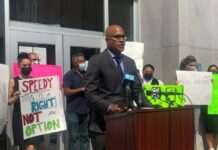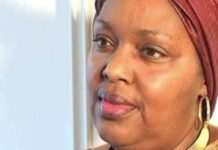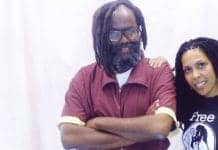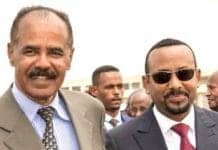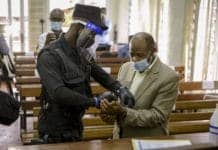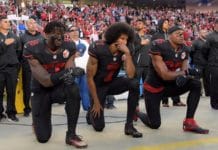by Ann Garrison
Since seizing power in Rwanda in 1994, dictator and U.S. military partner Paul Kagame has ruled the tiny East African nation with an iron fist that includes a complex nationwide network of spies and surveillance technology. At the same time, he has cultivated a myth that ethnic tensions in Rwanda are a thing of the past, and that the two major ethnic groups, Hutu and Tutsi, have reconciled, although nothing could be further from the truth.

Kagame has in fact effected a system of economic apartheid which empowers his Tutsi elite, oppresses the Hutu majority, and constantly blames and punishes the Hutu for the 1994 massacres. The description of the massacres as “Tutsi genocide” is even constitutionally codified and enforced.
Victoire Ingabire Umuhoza, leader of the FDU-Inkingi Party, has been in prison since 2010, when she tried to run for president against Kagame. She is in her seventh year of a 15-year sentence.
The African Court of Human and People’s Rights is expected to rule soon on her appeal of her conviction on preposterous charges – conspiring with a terrorist group, inciting Rwandans to rise up against their rulers, and the speech crime of disagreeing with the official description of the 1994 massacres. She did in fact say that Hutu victims “before, during and after the genocide” should also be remembered, but that’s a preposterous crime.
Now another woman, Diane Rwigara, who attempted to run against Kagame in this year’s election, has been arrested. Kagame claims to be a champion of gender equality but the only two women who have ever tried to stand against him electorally are behind bars.
Now the other leaders of Victoire Ingabire’s FDU-Inkingi Party have been arrested. I spoke to Joseph Bukeye, a leader of the FDU in diaspora, who teaches economics in Brussels, Belgium.
Ann Garrison: What do you know about the status of your party members who have been arrested?
Joseph Bukeye: All seven of them and a member of the PDP-Imanzi Party are kept in the same tiny, overcrowded room, handcuffed 24 hours, despite a court injunction to remove the handcuffs at night. Their families are not allowed to visit them. Even their lawyers do not have regular access to them.
The food given to them by Rwandan police is a disaster by any standard.
Theophile Ntirutwa, who had gone missing since his arrest 19 days ago, has resurfaced at Remera Police Station, but the police deny holding him.
AG: And how is this affecting Victoire Ingabire?
JB: Four of the people who were arrested were the ones who were looking after Victoire; they took food to her in prison every day. After their arrest, it took a whole week to find someone else to take food to her in prison. Eventually the house workers were released and allowed to resume taking food to her, but the situation is far from stabilizing. Right now, only one person has a pass to visit her. What will happen if he becomes unable to do so?
AG: Do you think this has anything to do with the expectation that the African Court of Human and People’s Rights will soon rule on Victoire’s appeal of her conviction and 15-year sentence?
JB: It may be part of the explanation, but it goes beyond the issue of the African court proceedings. The regime wants ultimately to wipe out any dissenting voice, whichever corner it may come from.
FDU was targeted because it is the main opposition force present on the ground in Rwanda. But through FDU, Kagame and his Rwandan Patriotic Front Party (RPF) are targeting the shared platform of the coalition of five opposition parties.
At the same time, the family of Diane Rwigara, another political opponent, has been arrested on charges not only of fiscal fraud and tax evasion, as was first claimed, but also of attempting to destabilize the RPF government, a charge systematically leveled against any political opponent arrested.
AG: The U.S. is donor No. 1 to Rwanda, the UK donor No. 2. Have you been able to gain any audience with either government to discuss your fellow party members’ situation? I know that a subcommittee of our House Foreign Affairs Committee will hold yet another hearing on Rwanda soon, and that David Himbara, one of the winners of this year’s Victoire Ingabire Umuhoza for Democracy and Peace Prize, will testify.
JB: We have alerted the two countries, but we don’t have yet any concrete answer. We also let the Netherlands and Belgium know, but also without results so far. We will also appeal to the European Union.
However, from experience, we don’t expect any action, apart from soft diplomatic steps that RPF ridicules. The only thing that matters for RPF is money.
If donors do not condition their money on human rights standards, the RPF will continue to crack down. As for the hearing in the U.S. Congress, it is a welcome move but has to be followed by actions.
AG: Is there anything else you’d like readers to know?
JB: This move by Kagame and the RPF to tighten their grip on the democratic opposition will send the wrong signal – that the only remaining opportunity to change the government is through violence. Ethnic apartheid and simmering tensions still exist in Rwanda, contrary to Kagame’s propaganda, and bitter rifts have also developed within the ruling party; many of its most prominent and influential members have gone into exile.
The governments of the U.S. and U.K. should bear in mind that such unjust and bitter divisions could ignite another violent implosion. Should another Rwandan tragedy take place, the international community will know that they are responsible as the principal donors to the Rwandan dictatorship, and their faux humanitarian urgencies to war – to “stop the next Rwanda” – will implode as well.
Oakland writer Ann Garrison writes for the San Francisco Bay View, Black Agenda Report, Black Star News, Counterpunch and her own website, Ann Garrison, and produces for AfrobeatRadio on WBAI-NYC, KPFA Evening News, KPFA Flashpoints and for her own YouTube Channel, AnnieGetYourGang. She can be reached at anniegarrison@gmail.com. In March 2014 she was awarded the Victoire Ingabire Umuhoza Democracy and Peace Prize for promoting peace in the Great Lakes Region of Africa through her reporting.

 Store
Store



